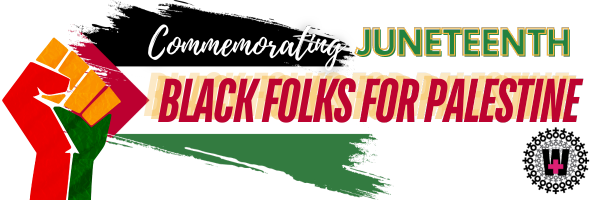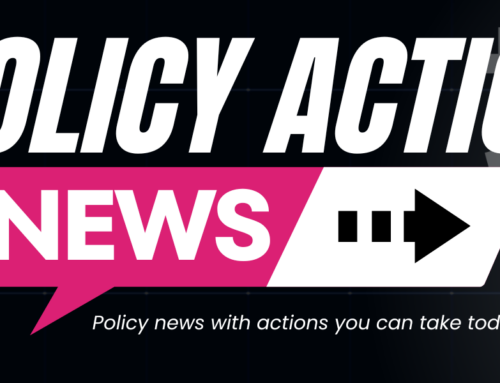
by Elena Ferguson and Sallie Thomas, in collaboration with all of PWN’s Black staff members.
June 19th, 2024
Today Positive Women’s Network-USA (PWN) commemorates Juneteenth, in recognition of the emancipation of Black people enslaved across the United States. Juneteenth is observed as a day of celebration, a day of reflection on how far we have come, and a day that reminds us that the fight for Black freedom is far from over.
While Juneteenth marks a moment to celebrate and commemorate freedom from enslavement, we are clear that there is still so far to go in our struggle for Black liberation. From the state abortion bans that threaten the health and bodily autonomy of Black pregnant people across the country, to the erasure of Black undocumented immigrants from the immigration narrative and the higher rates of incarceration that Black women face, it is clear that anti-Blackness, white supremacy, and misogynoir continue to threaten our dreams of Black liberation.
We cannot commit to Black liberation without also committing to the liberation of the Palestinian people, who are facing a harrowing genocide at the hands of the Israeli government and aided by the U.S. government, one that we are watching play out on our smartphones in real-time. Since October 7th 2023, more than 35,000 Palestininans in Gaza have been murdered at the hands of the Israel Defense Forces (IDF), with more than 15,000 of the dead being children.
Famed Black activist and poet, June Jordan, once said that there are two issues that are a litmus test for morality, one is what you are prepared to do on behalf of the Palestinian people. It is for that reason that Black Americans living with HIV and Black people across the U.S. must stand proudly and publicly in solidarity with Palestinians.
There are many similarities in the experiences of Black Americans and Palestinians but none more so than our shared history of occupation, dispossession, ethnic cleansing, colonization, state-sanctioned violence, medical exploitation and resilience. We cannot also forget the experiences of our Afro-Palestininan siblings, who can face even more state sanctioned violence and harassment.
Police violence in the U.S. closely mirrors oppressive techniques used by Israeli military forces, including the recent destruction of Palestinian solidarity encampments, and arrest of Black and Brown anti-genocide demonstrators, on U.S. campuses. This is not a coincidence. Thousands of police officials have been sent to Israel for training or are trained by Israeli officials here in the U.S. The goal is nominally to learn counterterrorism techniques. However these programs facilitate the sharing of practices and technologies between high-ranking U.S. police officials and a militarized occupying force that has been cited for extrajudicial killings, torture, excessive force, and suppression of freedom of expression. These exchanges reinforce already devastating police practices of anti-Black surveillance, racial profiling and suppression of public protests through force in the US.
As an organization that fights for all self-identifying women and gender diverse people living with HIV in America, we at PWN understand that healthcare is a human right. Cases of HIV and deaths due to AIDS-related complications are rising in the occupied Palestinian territories). Between 1988 and 2017, there have been 98 documented people living with HIV. However, this number is not reflective of the true HIV/AIDS epidemic in Palestine as there is a shortage of information, likely due to insufficient investment in healthcare infrastructure, including the collection, monitoring and analysis of health data.
Of the Palestinians who have fled their homes seeking safety from bombings and those who have not survived, some of them are (or were) living with HIV. Access to healthcare is practically impossible. Gaza’s entire healthcare system has been decimated and people’s medical needs continue to grow. The genocide in Palestine deserves visibility; the people of Palestine deserve to live healthy lives free from the threat of violence and premature death. As Black staff at PWN we cannot stand by and witness a divestment from healthcare and an investment in genocide without raising our voices in resistance as Black folks have done for centuries.
Black Americans have a long history of standing in solidarity with Palestinians. In 1967, the Student Nonviolent Coordinating Committee published a primer on the “Palestine problem” describing Zionism as an imperial project upheld by the “white western colonial governments” of the United States and Europe. In 1970, the Black Panther Party published a statement in The New York Times entitled “An Appeal by Black Americans Against United States Support for the Zionist Government of Israel.” Jesse Jackson led a delegation to the Middle East in the 1980s and met with the leaders of the Palestinian Liberation Organization and recognized our shared anti-colonial struggle with Palestinians. In 2017, during the Ferguson Uprisings in the wake of Michael Brown’s murder at the hands of police, activists in Gaza and the West Bank tweeted their messages of support for the uprisings and offered advice on how to deal with tear gas inhalation.
Angela Davis once said, “Black solidarity with Palestine allows us to understand the nature of contemporary racism more deeply.” Black people have a long standing tradition of standing with other people around the world in the fights we are still fighting for ourselves. The people of Palestine share our struggle to end the racism and oppression that colonialism has plagued us with. We are following in the footsteps of some of the greatest Black activists who have boldly supported Palestinian causes. Because our freedom is incomplete without the freedom of the Palestinians.
Black staff of PWN are constantly imagining a world where we can all be free. We practice, with principled struggle, how to make our dreams real. So, we must ask ourselves if liberation in the U.S. is possible without the liberation of Palestine. We dream of freedom and safety for Palestinians and we demand that the Biden administration call for an immediate and permanent ceasefire. This includes the restoration of food, water, electricity, and medical care for the Palestinian people. We demand that the U.S. no longer aid Israel in its imprisoning and its’ enaction of genocide to wipe Palestinian people—women, babies, families—from the face of the Earth. We stand in solidarity with U.S. protesters like the students of Spelman College in support of Palestine being able to exercise their First Amendment right to free speech without being subjected to violent interactions with the police. Black staff dream of Palestinian liberation because we know our liberation is linked.
At protests in support of Palestinians across the country, it is not uncommon to hear the chant, “Intifada! Intifada! Long live the intifada!” Intifada comes from the Arabic root meaning to shake off, as if dust from a cloth. It’s a term Arabic speakers use to describe any kind of social uprising aimed at shaking off an oppressive system. As Black Americans in the belly of the beast, we stand with the people of Palestine, the people of the Congo, and the people of Sudan, who continue to struggle and shake off their oppressors and take the boots off their necks. We will stand here until liberation, freedom, and emancipation for all marginalized peoples around the world is attained. Free Palestine 🍉
If you are looking for meaningful ways to recognize Juneteenth this year, PWN’s Black staff ask that you stand in solidarity with us by supporting Palestinians in Gaza. Here are a few ways to support:
- Check out the U.S. Campaign for Palestinian Rights’ action toolkit and find ways to take action for an immediate and permanent ceasefire.
- Purchase merchandise from Philadelphia Printworks’ Ceasefire Now Collection. Philadelphia Printworks is a Black-owned independent clothing brand. A minimum of 25% of the net proceeds from every sale will be contributed to a recognized organization dedicated to the cause of Palestinian liberation.
- Purchase an e-sim card so that someone in Gaza can maintain their access to the internet and outside world.
- Check-out Operation Olive Branch and donate to families in Gaza in need
- To learn more about Black-Palestinian solidarity, check out Black Women Radical’s SOLIDARITY WITH PALESTINE – A RADICAL BLACK FEMINIST MANDATE: A READING LIST



